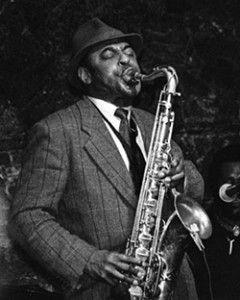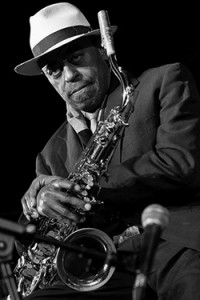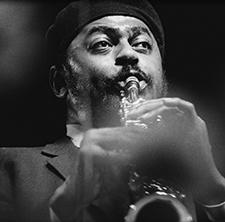Jean Bach, a lifelong jazz zealot whose fascination with a photograph of the titans of jazz gathered in front of a Harlem brownstone in 1958 led her to make a prizewinning movie about that moment, “A Great Day in Harlem,” 36 years later, died on Monday at her home in Manhattan. She was 94.
The photographer Carol Friedman, a friend, announced the death.
A print of that black-and-white photograph — one of the most famous in jazz history — had for years hung in the office of Ms. Bach’s husband, Bob, a television executive. Art Kane, a fashion and music photographer on assignment for Esquire magazine, had taken it on Aug. 12, 1958, in front of 17 East 126th Street, off Fifth Avenue, having assembled 57 jazz musicians for the group portrait at the ungodly hour — for most of them — of 10 a.m.
On the stoop or standing in front of it were Count Basie, Lester Young, Gene Krupa, Dizzy Gillespie, Thelonious Monk, Art Blakey, Charles Mingus, Horace Silver, Sonny Rollins, Marian McPartland, Coleman Hawkins, Gerry Mulligan, Mary Lou Williams and 44 other musicians (along with children from the neighborhood). Esquire published the photo in 1959.
After her husband died in 1985, Ms. Bach, a radio producer, learned that Milt Hinton, the bassist and jazz photographer, had a home movie of the original 1958 shoot. Though she had no experience making movies, Ms. Bach acquired it and decided to use it as the basis of an hourlong film, complementing the footage with interviews with musicians who were in the photo, clips of their performances, and narration by Quincy Jones.
Released in 1994, “A Great Day in Harlem” won the top award at the Chicago International Film Festival and was nominated for an Academy Award.
The jazz critic Whitney Balliett, writing in The New Yorker, called the film “a brilliant, funny, moving, altogether miraculous documentary.”
Ms. Bach had not originally intended it to be a movie. She had envisioned it as a series of recorded conversations that she would ultimately donate to the Smithsonian Institution. “I even planned on what I was going to wear to the ceremony,” she told The Chicago Tribune, “which pearls I would select, and how I was going to be very gracious about it all.”
For years, Ms. Bach was a fixture in the New York jazz world, with encyclopedic knowledge of the music, virtually unmatched connections and a reputation for giving great parties at her home in Greenwich Village. A gossip columnist once wrote that Frank Sinatra’s first question on coming to town was, “What’s happening down at Jean’s?”
After Ms. Bach and the pianist and singer Bobby Short had a party in 1981 to celebrate their 40 years of friendship, Mr. Short described what drew him to her when they met in 1942 at the Sherman Hotel in Chicago.
“I was a baby just out of high school,” he told The New Yorker in 1983, “and what drew me to Jean was not only her love for Duke Ellington but the fact that she could sing note for note Ben Webster solos and Cootie Williams solos and Johnny Hodges solos. And — she knew my idol, Ivie Anderson,” who sang with Ellington’s band.
Ms. Bach, he said, was “by far the most elegant and beautiful and sharply intelligent person I had ever met.”
Jean Enzinger was born on Sept. 27, 1918, in Chicago and grew up there and in Milwaukee. Her father worked in advertising, and her childhood household was full of music and parties. As a teenager she knocked on Duke Ellington’s door and established a lasting friendship.
Moving east to attend Vassar College, a short train ride from Harlem, she practically majored in trips to the Apollo Theater. In 1941, back in Chicago, she was at the Three Deuces when she met the trumpeter Shorty Sherock, then with Gene Krupa’s band. They married three weeks later.
Mr. Sherock later had his own band, which she managed. After they divorced in 1947, Ms. Bach worked as a radio scriptwriter and then as a press agent.
In 1948 she married Bob Bach, who was production coordinator for the television show “What’s My Line?” One member of the show’s celebrity panel was Arlene Francis, whose daily radio show on WOR she produced from 1960 to 1984.
Ms. Francis’s show, originally broadcast from Sardi’s, the theater district restaurant, became known for the guests Ms. Bach booked and who ranged from Leopold Stokowski to Ellington to Carl Sandburg.
In 1997 Ms. Bach directed a second movie, using outtakes from “A Great Day in Harlem.” In 20 minutes it solved one of the stranger riddles in jazz history: Did Dizzy Gillespie, in 1941, actually shoot spitballs onstage at his boss, the bandleader Cab Calloway, who promptly fired him?
No, Ms. Bach found. Interviewed for the film, “The Spitball Story,” the trumpeter Jonah Jones confessed to having done the deed. The short won awards at the Chicago International Film Festival, the Newport International Film Festival and the USA Film Festival.
In her later years, Ms. Bach, who left no immediate survivors, worked on a documentary about the saxophonist Gerry Mulligan, which is unfinished. It was all part of her mission of finding and preserving a world that seemed to be fading away in front of her.
Until six months ago, she was out on the town listening to jazz.
Originally published at NYTimes.com.



 Archie Shepp is a prominent African American jazz saxophonist. He has been a feared firebrand and radical, soulful throwback and contemplative veteran. He was viewed in the ‘60s as perhaps the most articulate and disturbing member of the free generation, a published playwright willing to speak on the record in unsparing, explicit fashion about social injustice and the anger and rage he felt. His tenor sax solos were searing, harsh, and unrelenting, played with vivid intensity. In the 70’s, Shepp employed a fatback/swing based R&B approach, and in the ‘80s he mixed straight bebop, ballads, and blues pieces displaying little of the fury and fire from his earlier days.
Archie Shepp is a prominent African American jazz saxophonist. He has been a feared firebrand and radical, soulful throwback and contemplative veteran. He was viewed in the ‘60s as perhaps the most articulate and disturbing member of the free generation, a published playwright willing to speak on the record in unsparing, explicit fashion about social injustice and the anger and rage he felt. His tenor sax solos were searing, harsh, and unrelenting, played with vivid intensity. In the 70’s, Shepp employed a fatback/swing based R&B approach, and in the ‘80s he mixed straight bebop, ballads, and blues pieces displaying little of the fury and fire from his earlier days. In 1965, Shepp released Fire Music, which included the first signs of his increasingly prominent political consciousness and Afrocentricity; it included the reading of an elegy for Malcolm X, and the title is derived from a ceremonial African music tradition. The Magic of Ju-Ju defined his sound for the next few years: freeform avant-garde saxophone lines coupled with the rhythms and ideologies of Africa.
In 1965, Shepp released Fire Music, which included the first signs of his increasingly prominent political consciousness and Afrocentricity; it included the reading of an elegy for Malcolm X, and the title is derived from a ceremonial African music tradition. The Magic of Ju-Ju defined his sound for the next few years: freeform avant-garde saxophone lines coupled with the rhythms and ideologies of Africa. He then found his own record label in 2004 with Monette Berthomier, Archieball. The label is in Paris and features collaborations with Jacques Coursil, Monica Passos, Bernard Lubat, and Frank Cassenti.
He then found his own record label in 2004 with Monette Berthomier, Archieball. The label is in Paris and features collaborations with Jacques Coursil, Monica Passos, Bernard Lubat, and Frank Cassenti.